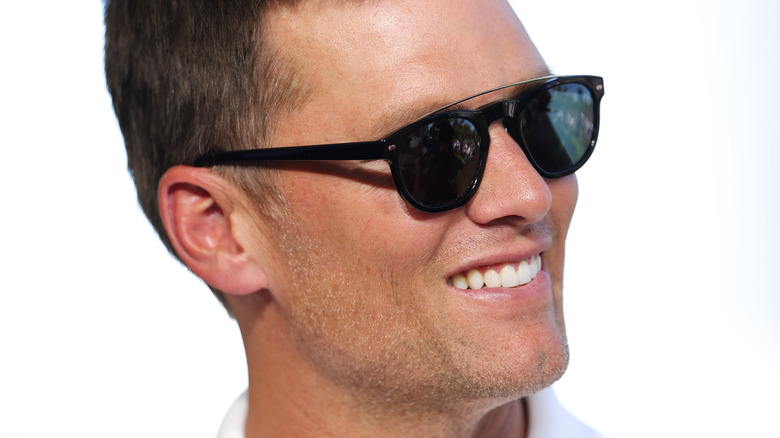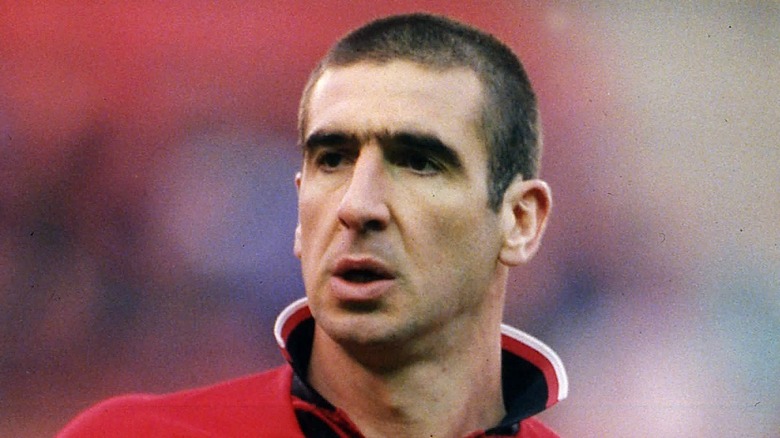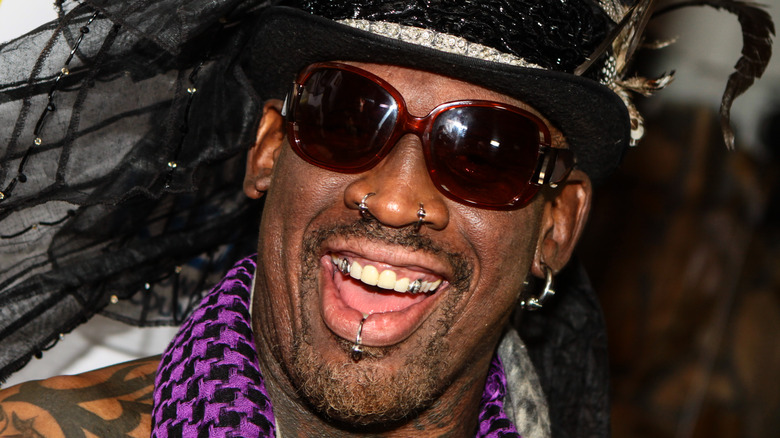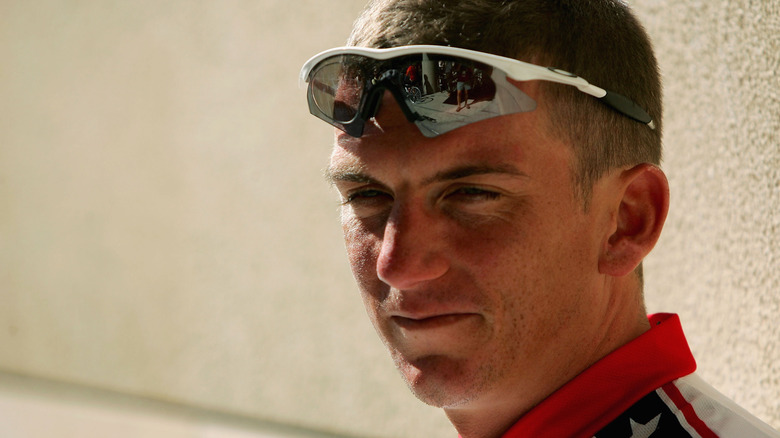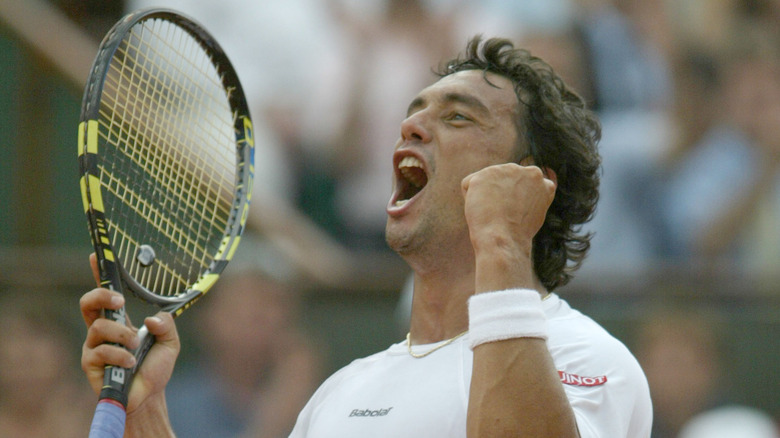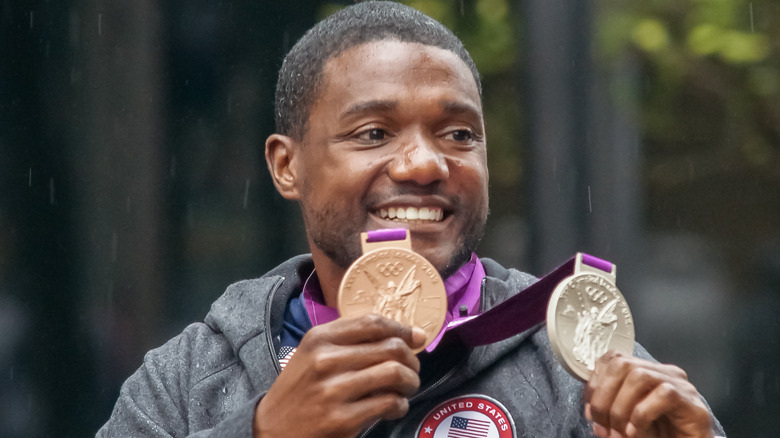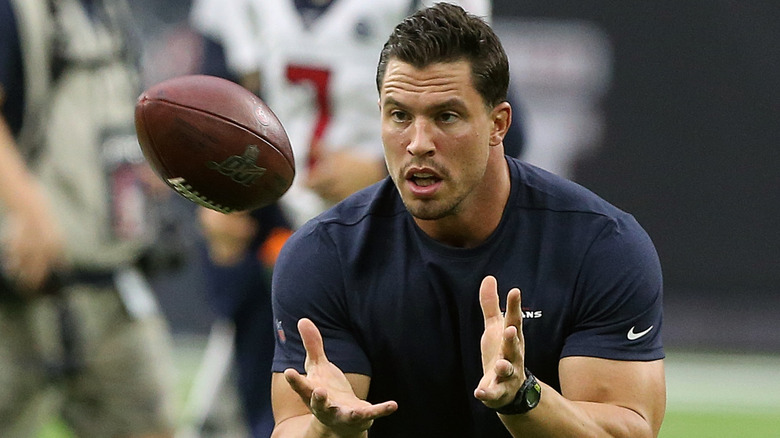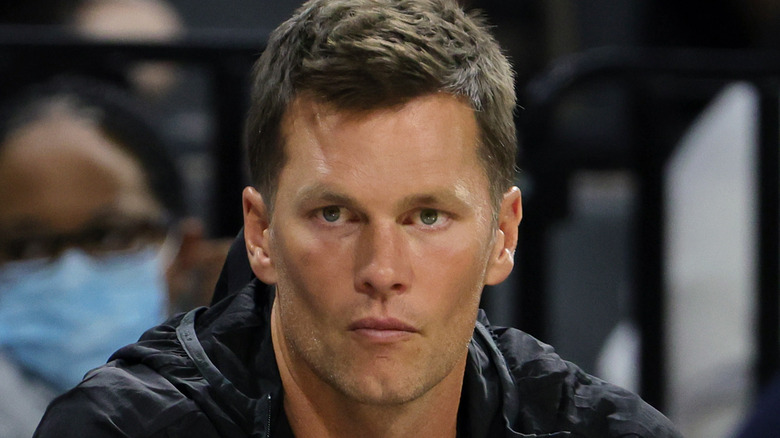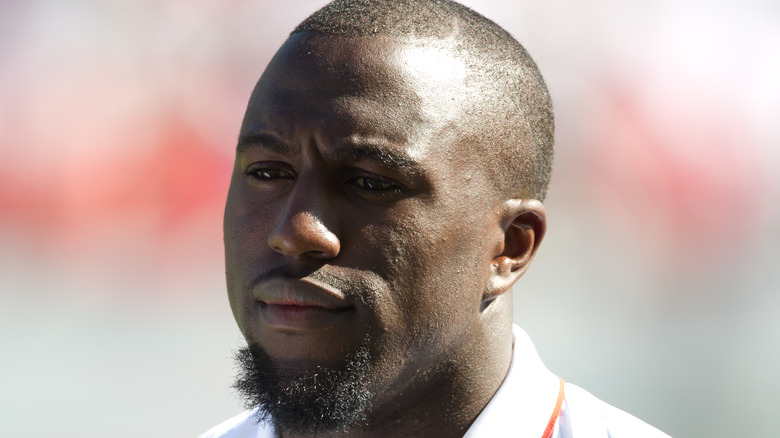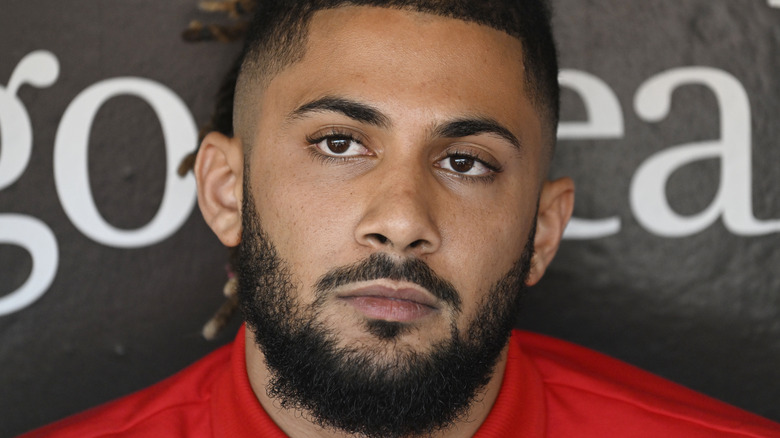The Worst Excuses Ever After Athletes Got Suspended
For every thousand or so athletes out there who train endlessly for a shot at the professional circuit or the Olympic podium, you'll likely come across a few who prefer to roll the dice and pursue another avenue to the top. Purists, on the other hand, believe the spoils are available only to those who toil in gyms and on fields for even a remote grasp at the brass ring or medal. This belief is confirmed by the steroid, blood-doping and performance-enhancing drug scandals throughout history which toppled sporting greats like cyclist Lance Armstrong, San Francisco Giants slugger Barry Bonds, and Canadian sprinter Ben Johnson.
Drugs aren't the only vice, of course. Athletes occasionally cross a line by airing out their frustrations in ways that physically harm others. Other times, they simply don't play by the rules. What happens when sports celebrities are caught with their hands in the proverbial cookie jar?
Athletes (and the eager media flack they hire to mitigate the scandals) sometimes try to spin their way out of trouble. Even when nabbed red-handed, their excuses might be just as creative as the infractions they committed. Meanwhile, other reasons are as ludicrous as elementary school children claiming the dog ate their homework. Here's a look at sports stars who came up with some rather colorful justifications for the acts they committed, perhaps oblivious to the fact that they knowingly violated the code of fair play.
Eric Cantona got punted over a drop-kick
Eric Cantona was one of France's most memorable exports to the British soccer scene during the '90s, helping to steer Manchester United to two consecutive Premier League titles thanks to his status as a prolific goalscorer – and a mean streak running through his physiology. That short fuse brightly lit up in one incident during a 1995 match against Crystal Palace, the very team Man U defeated to win those league championships. Roughly halfway through the match, an opponent tackled Cantona from behind, provoking the Man U star to kick him. The referee issued Cantona a red card, punting him out of the game, David Lacey explained for The Guardian.
While being escorted to the dressing room, Cantona heard the jeers from the hometown Crystal Palace crowd, including Matthew Simmons, who was sitting at the bottom of the bleachers. His position made him an easy target for Cantona, who retaliated to the taunts by drop-kicking Simmons, earning himself a nine-month suspension. Man U suffered from his absence, losing in the FA Cup final 1-0 to Everton that season. Cantona claimed his actions were triggered by Simmons yelling racial insults at him, an argument that didn't go over well, given that both participants in the altercation were white. But years later, he still remained unrepentant over the drop-kick. "I have one regret," he said in the documentary "The United Way" (via the Mirror). "I would have loved to have kicked him even harder."
Dennis Rodman kicked a cameraman
You can't take away the fact that Dennis Rodman was one of the NBA's best rebounders, helping turn the Chicago Bulls into a basketball dynasty in the 1990s. But even on the hardwoods, he was trouble, as the power forward was consistently fined for missing practices and suspended for altercations with players, referees, and even swearing during a live TV broadcast (via News on 6). Away from the game, Rodman also dotted his career with a few eccentricities, like having a brief romance with Madonna, appearing at a media function in a wedding dress announcing he was marrying himself, and even hitting the professional wrestling circuit.
But Rodman's most infamous moment on the court took place in 1997 with the Bulls at home to the Minnesota Timberwolves. During one crucial play, Rodman staggered out of bounds, colliding with a photographer, per the Chicago Tribune. Frustrated, Rodman kicked nearby cameraman Eugene Amos, who was carried away in a stretcher. Rodman was fined $25,000, suspended unpaid for 11 games, and had the Bulls settle a lawsuit launched by the injured party for $200,000 (via the AP).
For his part, Rodman claimed that Amos had no business being that close to the court and insinuated that the kick he launched wasn't severe enough to cause a major injury. But whether Rodman felt the NBA wanted to make an example out of him or whether he craved his bad-boy reputation, there's no arguing a point he made to the Chicago Tribune: "Where there's controversy, I'm always in the middle of it."
Tyler Hamilton's vanishing twin argument fell flat
The stripping of 7 Tour de France titles from Lance Armstrong in 2012 in the wake of evidence that he used performance-enhancing drugs was by far the biggest scandal in the world of cycling. But eight years earlier, an even more bizarre case of doping made its way through the circuit involving U.S. athlete Tyler Hamilton. The 2004 Olympic gold medalist was banned from professional cycling for two years by the Tribunal of Arbitration in Sport after officials found evidence of doping in his samples, claiming he cranked his red cells up by injecting someone else's blood into his body. But Hamilton maintained his innocence on grounds of what's now called the "vanishing twin" incident, a medical condition otherwise known as chimerism (per The Guardian).
Apparently, chimerism occurs when an impregnated mother carries twins in early stages until one fetus dies, but not before sharing cells with the surviving embryo, which would henceforth carry two different types of blood. It's a condition that could exist in up to 70 percent of the population, according to Dr. Ann Reed, who chaired Mayo Clinic's rheumatology research department at the time. "Some believe that if you look hard enough, you could find chimerism in anybody," she said to The New York Times. It wasn't enough to convince the Tribunal at his appeal, as Hamilton found himself banned from cycling until 2007. Ironically, in 2009 he acknowledged previously having a banned substance in his blood, which ended his career.
Mariano Puerta lied about his medication
In 2005, Argentinian tennis star Mariano Puerta reached his prime taking on superstar Rafael Nadal in a French Open title match. While Nadal managed to win that final, it turned out that Puerta's drive to the summit wasn't exactly justified. A few months later, the International Tennis Federation reported that Puerta tested positive for a banned substance, which forced the athlete to return his French Open prize money (worth 443,282 euros at the time) and leave the sport for eight years. Sample results revealed Puerta had taken etilefrine, which stimulates the respiratory system. It also didn't help that Puerta already had a record for violations; he had tested positive for clenbuterol in 2003 (per The Guardian).
That's when the player, then a top-10 contender, got together with his lawyers, who advised Puerta to claim that he accidentally drank his then-wife's glass of water containing a menstrual cramp medication called Effortil, which included the very ingredient that landed him in trouble. Given his previous infraction, Puerta was told this was the only explanation that might get him off the hook. Although the federation didn't entirely buy the excuse, they reduced his suspension to two years. In 2020, long after he retired, Puerta admitted to La Nación (via AP News) that what he actually ingested was a mix of caffeine pills and Ginseng. Still, he advised upstart players to be responsible for their lives, adding, "The price that you might pay for making a mistake is very high."
Justin Gatlin rubbed anti-dopers the wrong way
During his sprinting days, Olympic gold medalist Justin Gatlin would receive rubdowns as part of his training regimen. Unfortunately, one session turned into a shakedown instead, one that could have destroyed his athletic career. Two years after his top-podium finish in the 100-meter dash at the 2004 Summer Games in Athens, Gatlin tested positive for testosterone and was faced with an eight-year expulsion from track and field (per Sports Illustrated). That's when the athlete, previously penalized in 2001 for having amphetamines in his system, said the banned substance was in a cream administered by a massage therapist, a claim relentlessly backed by his coach Trevor Graham. "We are trying to go out and make sure we can prove his innocence, and we hope this individual has the guts to come forward and say he did it," said Graham to The Washington Post.
The massage therapist, Chris Whetstine, who worked with Gatlin in 2003 as well as track star Marion Jones and golfer Ben Crane, denied the charges, as did many of his colleagues and supporters. "It's just preposterous on so many fronts," said former runner Alberto Salazar to ESPN. "I guess anything's possible, but it just doesn't make sense." Interestingly, the U.S. Anti-Doping Agency was also investigating Graham concerning a separate designer drug scandal and offered to cut Gatlin's suspension period in half if he cooperated with authorities. Graham was banned for life from sports in 2008; two years later, Gatlin successfully returned to the track.
Sean Avery got sloppy with his comments
Dallas Stars forward Sean Avery was the NHL's bad boy, often leading the league in penalty minutes. However, his most controversial infraction took place off the ice in 2008. In a media scrum in Calgary, where the Stars were slated to play the hometown Flames, he threw shade at opposition defenseman Dion Phaneuf, who was then going out with "24" actor Elisha Cuthbert, Avery's former girlfriend. "I just want to comment on how it's become like a common thing in the NHL for guys to fall in love with my sloppy seconds," he told reporters, in a poke at Phaneuf (per ESPN).
That dig that could have also targeted Los Angeles Kings center Jarret Stoll, who was dating model Rachel Hunter, another Avery ex-girlfriend. Either way, the NHL wasn't impressed, suspending Avery for six games with no pay. "Playing in the National Hockey League is a privilege, requiring a high standard of personal behavior," said league commissioner Gary Bettman in a statement (per CBC Sports). Avery, who has previously been taken to task over mouthing off to the media, thought the incident was harmless, a way to amp up excitement before the Flames match, until he realized the consequences of his actions. "As many of you know, I like to mix it up on and off the ice from time to time," he said in an apology given to SportingNews.com (via CTV News), "but understand that this time I took it too far."
Brian Cushing said he hit the gym too hard
When the gridiron action intensifies into absolute smash-mouth mayhem, it stands to reason that football players work harder to get the edge over their opponents. Houston Texans linebacker Brian Cushing worked harder than most, to the point where he came up with not one, but two excuses. In 2010, his urine sample tested positive for hCG, a female fertility drug that's on the NFL's list of banned substances. According to research, the item in question boosts the level of testosterone in an athlete's body.
Once caught, Cushing defended using hCG, claiming he had a tumor somewhere in his body. However, Dr. Gary Wadler, a chair on the World Anti-Doping Agency, said that anyone with the tumor would repeatedly test positive for hCG. Cushing had only one test that raised red flags. "If he had a tumor that produced hCG, he wouldn't be playing football," Wadler told the Associated Press (via NBC Sports). "He would be under treatment for a malignant tumor." That's when Cushing cooked up another excuse: Overtrained Athlete Syndrome, a condition responsible for surges in testosterone when an athlete rests between lengthy and vigorous workouts. "I think that's the final diagnosis we came up with, and a lot of doctors have supported why this has happened," Cushing told the press (via ESPN). The NFL didn't buy either argument and issued Cushing a four-game suspension. For another violation in 2017, he was suspended from 10 games.
Guillermo Mota was nailed for cough syrup substance
One of the most severe suspensions over banned substances in Major League Baseball affected San Francisco Giants relief pitcher Guillermo Mota, who found himself suspended for 100 games in 2012 for taking a performance-enhancing drug called clenbuterol, the AP reported (via ESPN). The irony was that Mota and his entourage of supporters claimed the substance discovered in a urine sample was from a children's cough syrup, a product easily available over the counter at any pharmacy.
This was an argument that his agent Adam Katz strongly emphasized in a statement issued to the league. "A 100-game suspension for taking a children's cough medicine that contains trace amounts of a prohibited substance, which is what happened here, is severe and unfair and does not reflect the intention of the Joint Drug Prevention and Treatment Program," Katz stated (per ESPN). A grievance was filed by the Major League Baseball Players Association on his behalf against the league.
One strike against Mota, however, was a previous positive drug test that resulted in the pitcher sitting out for 50 games in 2007 when he was with the New York Mets. Whether that was a factor in the MLB issuing a suspension and turning down Mota's appeal remains speculative. But Mota didn't argue the final decision, saying, "I did not read the label. It was a mistake" (via the San Francisco Chronicle). Mota ultimately retired from the sport in 2012 after 14 Major League seasons.
Deflate-gate took the air out of Tom Brady
During his years with the New England Patriots and Tampa Buccaneers, NFL quarterback Tom Brady was sometimes considered the GOAT (Greatest Of All Time). But in 2015, that reputation was shaken in the wake of what's now called Deflategate, when Brady wanted Patriots equipment managers to reduce the air pressure in all the footballs, so they would suit his grip. Suspicions first surfaced during one game against the Colts, when the Colts equipment manager noticed the balls intercepted by his team's safety Mike Adams were softer than usual (via NBC Sports). Then, when the Patriots trounced those same Colts in a conference final on their way to winning the Superbowl, NFL officials investigated at halftime and discovered the air pressure in the footballs was lower than allowed.
During the playoff run, Brady insisted at a media conference, "I didn't alter the ball in any way" (per The Guardian). But investigators implicated Brady's involvement when he claimed he had his phone destroyed just before being questioned, adding that it was standard practice every time he got a new one (according to Insider). The league was unconvinced, given the timing of his act, since Brady had that old phone for mere months. Additionally, a digital forensics expert's findings determined that a previous phone was never destroyed, conflicting with Brady's alleged common practice.
Believing Brady was complicit, the league suspended him for four games, although a wave of appeals delayed implementation. Brady eventually relented and served his suspension at the start of the 2016 season.
Chris Sale got ripped over knifing jerseys
One of the most important parts of a Major League Baseball pitcher's job description is throwing enough balls across home plate to get the opposing batter out. In the case of Chicago White Sox hurler Chris Sale, he was never recruited to head the team's fashion police. The team realized Sale was an intense competitor on the mound, but away from the diamond, they didn't count on his temperament when it came to uniform apparel. Per Newsweek, the team was slated to wear commemorative throwback jerseys dating back to 1976 during a 2017 game against the Detroit Tigers. The squad never got to wear those threads on account of Sale taking a knife to the entire wardrobe shipped in for the occasion.
According to Sale, it wasn't so much the appearance of the uniforms that upset him. In an interview with MLB.com, he shared that they were downright uncomfortable. "If the players don't feel comfortable 100 percent about what we are doing to win the game, and we have an easy fix — it was as easy as hanging up another jersey and everyone was fine," he said. "For them to put business first over winning, that's when I lost it." Sale claimed his complaints to management fell on deaf years, so he took matters into his own hands. The team suspended Sale for five games and traded him to the Boston Red Sox at the end of the season.
Jozy Altidore was sorry/not sorry about red-carding
One of the most physical players in Major League Soccer, forward Jozy Altidore, has demonstrated he's no stranger to crossing the line of sporting behavior. When he was with Toronto FC in 2018, playing his former team New York City FC, Altidore was red-carded for a foul on an opposing player — he kicked at NYCFC team member Alexander Callens in frustration (per ABC 7). Altidore didn't deny the penalty that not only had him sit out the rest of the match but banned him from the field for two additional games.
Interestingly, Altidore didn't question the sentence, and neither did his coach Greg Vanney. But Vanney claimed that the foul committed by Altidore wasn't anywhere near as brutal as those made by New York, which referees didn't call. "He didn't kick through the guy; he didn't hurt the guy," he said about the Altidore penalty to SportsNet, adding, "It was a moment of emotion."
Despite a Toronto appeal, MLS upheld the suspension. It wasn't the first red-card experience for Altidore against New York, his former team before Joining Toronto. In 2017, he was ejected during a half-time scuffle with New York player Sacha Kljestan in a tunnel on the way to the dressing room. Two years earlier, during a game between Toronto and NYCFC, he also received a scarlet sentence for verbally abusing a referee while on the bench.
Burrito banned Shelby Houlihan from the track
Burritos might make for a delicious snack, but they can produce some negative side effects including gastrointestinal illness, or in the case of Shelby Houlihan, career obliteration. As a runner with high hopes of charging out of the starting blocks on the Tokyo track for the 2020 Summer Games, Houlihan had to put her aspirations on hold for a year due to COVID. But that delay became permanent the following year after Houlihan tested positive for the performance-enhancing drug nandrolone, prompting officials to ban her from track and field for four years (per Sports Illustrated).
According to her Instagram post, Houlihan was shocked over the finding, claiming she had never even heard of nandrolone. A food log she compiled the week she took the drug test, however, revealed she ate a pork burrito that could have contained that drug. "Pig organ meat (offal) has the highest level of nandrolone," she wrote. Houlihan's claim drew reaction from several detractors, including sports reporter Morgan Campbell, who scoffed on a CBC program that runners would have been aware of the banned drug. Nandrolone has been banned since 1974.
Houlihan seemed bewildered over her expulsion, later upheld by the Court of Arbitration for Sport. "I understand on the one hand that I'm responsible for what's in my body, and this obviously was in my body," said Houlihan to The Oregonian. "But to get banned for four years for something I didn't intentionally put there is definitely a bit extreme."
Fernando Tatis Jr. got clipped for 80 games
It's common knowledge that the expression "hair today, gone tomorrow," refers to baldness, but it could also apply to San Diego Padres shortstop Fernando Tatis Jr. In August 2022, Major League Baseball issued an 80-game suspension to Tatis Jr., whose medical samples tested positive for a performance-enhancing drug called clostebol, "a synthetic anabolic androgenic steroid" (per NIH). The ruling grounds the player until summer 2023. "I have no excuse for my error, and I would never do anything to cheat or disrespect this game I love," Tatis Jr. told the organization, admitting he failed to check the ingredients of a medication he had used.
However, his father defended his son with an excuse that went over as well as a bad haircut. In an interview with MLB insider Héctor Gómez (via TMZ), Fernando Tatis Sr. claimed his son discovered a fungus shortly after getting his locks trimmed. The player used a medicated cream to treat the condition, which turned out to be ringworm. But as far as Pops was concerned, the substance was much ado about nothing. "This is something for the skin, that's something that's not performance enhancing and has no testosterone," he said to Gomez. "It has nothing to help you improve in the game."
It turns out that clostebol, when used for lengthy periods, can enhance an athlete's performance. Ironically, per NIH, the best way to detect the substance is through hair samples.

